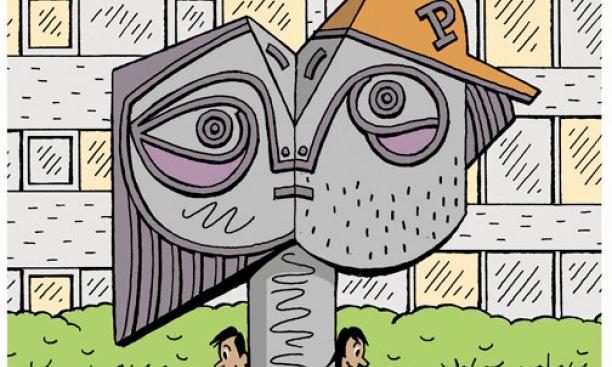

In October 2009, Princeton announced that upperclassmen rooms in Spelman Halls would become gender-neutral under a pilot program beginning in the fall of 2010.
LGBT advocates applauded the new policy for its accommodation of students uncomfortable living with students of the same gender, while the Princeton Torydecried the influence of a “progressive cabal” bent on destroying traditional gender norms.
Meanwhile, several groups of friends saw an opportunity to do something they previously could not: draw together into campus housing.
This fall, seven of these mixed-gender groups moved into Spelman’s apartment-style suites, which each feature a shared kitchen, bathroom, living room, and four single bedrooms.
Now the first reviews are in: Gender-neutral housing indeed has arrived at Princeton, and it is ... rather uneventful.
“We’re very neutral about gender-neutral housing,” said Emma Bédard, a senior living in Spelman 41.
Bédard and her roommates — two male, one female — explained that the gender mix did not feel all that significant. Friends are friends.
A few floors up from Bédard, the residents of Spelman 46 echoed this sentiment during one of their “family dinners,” which featured pasta, fair-trade chocolate, and dorm-brewed beer.
“It doesn’t feel any different to me than any other of the rooms that I’ve been in at Princeton,” said Sam Borchard, a senior, of living in a mixed-gendered suite.
Princeton was the second college in New Jersey (and the second-to-last in the Ivy League) to offer gender-neutral housing in select dorms. Montclair State first made the option available in 2005.
Rutgers University announced March 1 that it would follow suit. Many in the national media saw the school’s decision as a response to the September suicide of freshman Tyler Clementi, who killed himself after the online broadcast of a gay sexual encounter.
With spring room draw under way, Princeton’s gender-neutral program once again is limited to Spelman’s independent-student housing.
Housing director Andrew Kane said that while some students would like to see the housing option expand to other dorms, his office will not consider changes until a full year has been completed.
Summit on safe drinking
By Carolyn Edelstein ’10 GS
In recent years, Princeton students have been hospitalized with blood alcohol content above 0.40, a potentially lethal level. A campus coalition has been working to help prevent a devastating outcome by reducing high-risk drinking on campus, and a growing network of students from across the Ivy League shares this objective.
On March 6, Princeton’s Alcohol Coalition Committee concluded a weekend-long summit that brought together 25 students from six of the Ivies for a frank discussion about campus drinking cultures and how to help peers avoid alcohol-related hazards.
Elizabeth Borges ’11 and Amy Campbell, director of campus life initiatives, launched the Student Leaders Symposium this year in recognition of the common challenges faced not only by Ivy League students but by young adults across the United States. “Most Princeton students explain that they know what high-risk drinking is,” Borges said, “but find it hard in the moment to make the right choices.”
Borges spoke of the trend of students working with college officials to address the issue. “Every institution benefits from a network of peers who act not as disciplinarians, but rather educators or assistants,” said a Harvard representative at the summit.
Both Harvard and Princeton delegates described media campaigns they had created featuring prominent students sharing safe-drinking strategies.
Dartmouth’s pilot “Green Team” program received special attention. Modeled after a Haverford College initiative, the program trains and pays students to attend parties and step in when they see drinking practices or behavior that could become dangerous.
“It’s a powerful way of institutionalizing bystander intervention,” Borges said. “The Green Team members are anonymous partygoers. Because of this, anyone who intervenes could be assumed a member. It licenses action.”
Dartmouth students said that the Green Team attends parties on invitation, and that the program works best on campuses with a centralized party scene. Said Borges: “I would love to see something similar at Princeton.”
